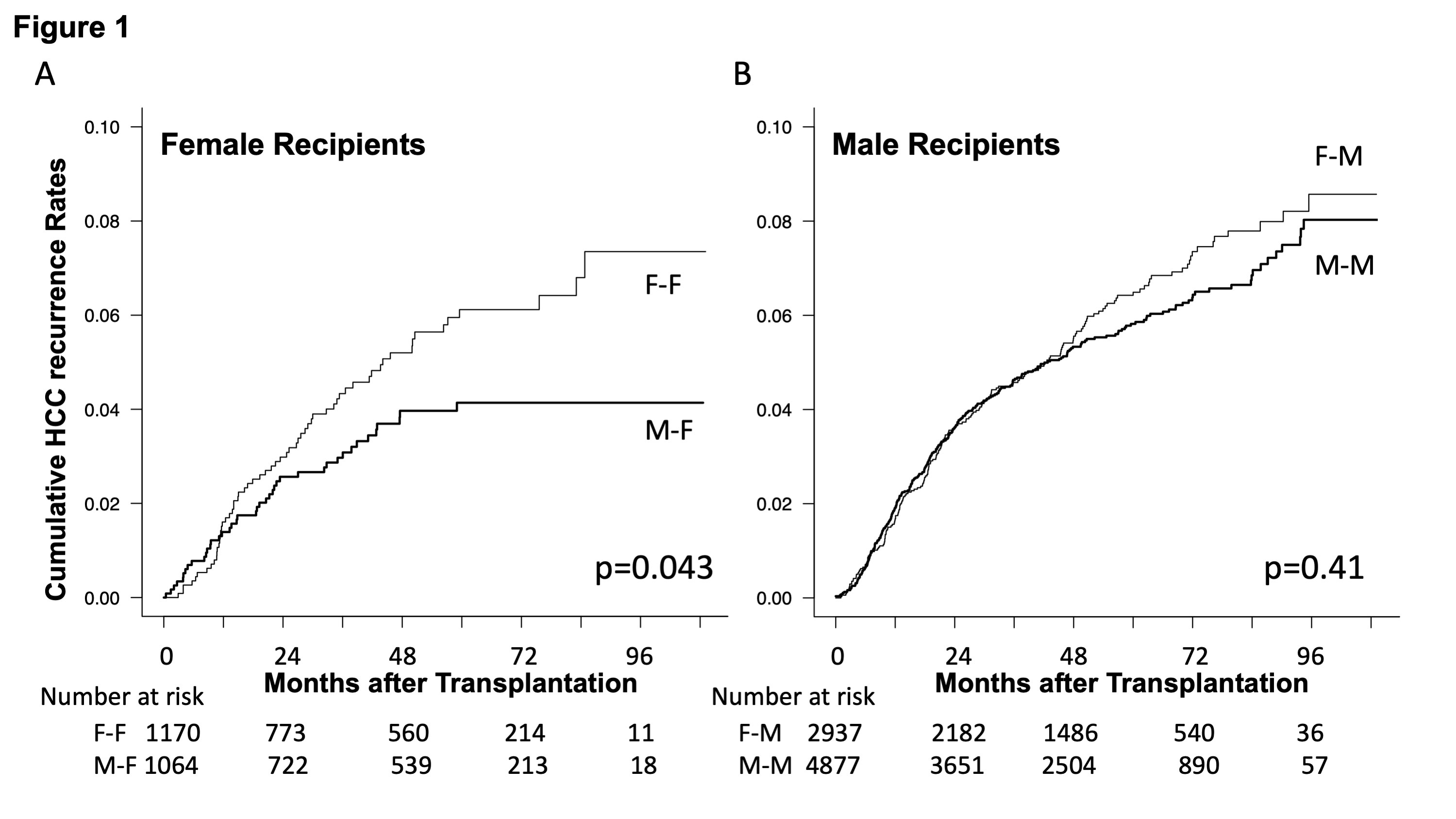Impacts Of Donor Gender On Recurrent Hepatocellular Carcinoma In Liver Transplant Donated After Brain Death
1Division of Transplant Surgery, Massachusetts General Hospital, Harvard Medical School, Boston, MA, 2Division of Abdominal Transplantation, Stanford University, Stanford, CA
Meeting: 2022 American Transplant Congress
Abstract number: 1105.1
Keywords: Hepatocellular carcinoma, Liver transplantation, Recurrence
Topic: Clinical Science » Liver » 56 - Liver: Hepatocellular Carcinoma and Other Malignancies
Session Information
Session Name: Liver: Hepatocellular Carcinoma and Other Malignancies
Session Type: Poster Abstract
Date: Sunday, June 5, 2022
Session Time: 7:00pm-8:00pm
 Presentation Time: 7:00pm-8:00pm
Presentation Time: 7:00pm-8:00pm
Location: Hynes Halls C & D
*Purpose: Hepatocellular carcinoma (HCC) is the most common form of primary liver cancer. It is well known that HCC is predominant in males and prognosis is better in females. There is as yet no study which investigates HCC recurrence based on gender mismatch that uses a cohort of liver transplant donated after brain death (DBDLT). The aim of this study is to clarify the effects of donor gender on HCC recurrence rates in DBDLT.
*Methods: This study included 9,434 adult recipients who underwent DBDLT for HCC in the United Network for Organ Sharing (UNOS) database with available pathological information from 2012-2018. Donor-recipient pairs were divided into (1) female donor/female recipient (F-F)(n=1170); (2) male donor/female recipient (M-F)(n=1064); (3) female donor/male recipient (F-M)(n=2937); and (4) male donor/male recipient (M-M)(n=4877). Differences of donor and recipient characteristics based on gender and prognostic influences of donor gender were evaluated. HCC recurrence was used as prognostic outcome and competing risk regression analysis was used to assess prognostic influences.
*Results: Between four groups, the median age of recipients and also MELD scores were clinically similar, although the median age of donors was significantly different due to study scale. Regarding macroscopic tumor characteristics, livers explanted from male recipients tended to demonstrate greater size and higher numbers of HCC. Furthermore, significant higher rates of vascular invasion were confirmed pathologically (<0.0001). The rates of poorly differentiated HCC in males were also modestly higher than those in females (p=0.11). Interestingly, cumulative recurrence rates of HCC were significantly lower in the MF group with a recipient death being considered as a competing risk (p=0.0232). The competing risk regression analyses, including tumor size, number, the rates of vascular invasion, poorly differentiated HCC, and the levels of logarithmic AFP, showed that liver grafts from male donors had protective effects against HCC recurring in female recipients (HR 0.66 95%CI;0.45-0.99) (P=0.043) (Figure 1A). On the other hand, the cumulative recurrence rate was not affected by the donor gender in the male recipients’ groups (HR 0.92 95%CI;0.77-1.11, P=0.41) (Figure 1B).
*Conclusions: In DBDLT, a male donor to female recipient pair showed lower HCC recurrence rates. This tendency was not clearly observed in other groups.
To cite this abstract in AMA style:
Nakamura T, Sasaki K, Yamamoto T, Kimura S, Dageforde L, Yeh H, Elias N, Kawai T, Markmann JF. Impacts Of Donor Gender On Recurrent Hepatocellular Carcinoma In Liver Transplant Donated After Brain Death [abstract]. Am J Transplant. 2022; 22 (suppl 3). https://atcmeetingabstracts.com/abstract/impacts-of-donor-gender-on-recurrent-hepatocellular-carcinoma-in-liver-transplant-donated-after-brain-death/. Accessed February 28, 2026.« Back to 2022 American Transplant Congress

